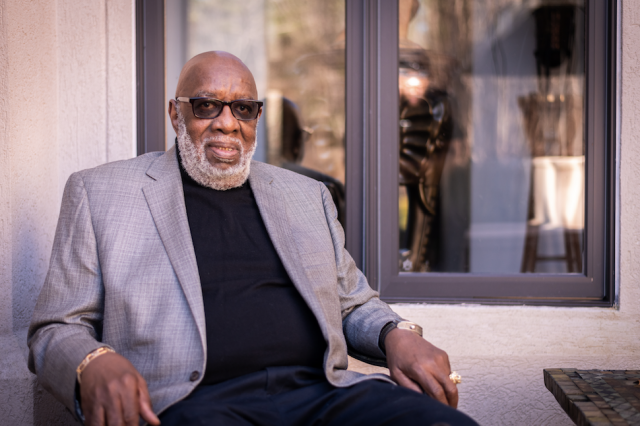
By Javacia Harris Bowser
For The Birmingham Times
Radio legend Dr. Shelley Stewart said he’s always “worked toward being able to sign the check on the front rather than the back.”
By the late-1960s and early-1970s, Stewart had his sights set on radio sales, management, and station ownership. Back then, however, all of the salesmen in the South—even at Black-oriented stations—were white. Stewart’s requests to become a salesman at WENN-AM, where he worked in the 1960s, were denied or ignored.
Behind the scenes, though, Stewart started an advertising agency with a white, Jewish radio salesman named Cy Steiner. The shop, founded in 1967, was originally called Steiner Advertising, and Stewart’s involvement was hidden. Their clients—which included companies like Bruno’s, Buffalo Rock, and Parisian—knew the agency was a partnership between a white man and a Black man, but no one else did.
It wasn’t until Steiner’s death in 1992 that Stewart stepped to the forefront of the company. The agency, renamed o2ideas in 1997, represented big-name clients, such as Honda, Verizon Wireless, and the University of Alabama at Birmingham.
Stewart’s stellar achievements in broadcasting and business have earned him numerous awards, such as the American Advertising Federation’s Silver Medal Award, as well as inductions into the Alabama Broadcasting Hall of Fame and the Birmingham Business Hall of Fame. The Southern Poverty Law Center gave him a Lifetime Achievement Award, and in the early 1990s he received the Drum Major of Justice Award from the Southern Christian Leadership Conference (SCLC) along with other activist artists like Maya Angelou.
Of all these accolades, however, Stewart said the one that has meant the most was the recent Putting People First Award he received from the Mayor’s Office in October 2022. The city of Birmingham honored Stewart during its annual AWAKEN event, which is held during the week of the Magic City Classic and celebrates the legacy of community leaders and activists who have shaped the city.
In the 1970s, Stewart left WENN and worked at WATV-AM with renowned Birmingham pastor, radio announcer, and businessman Dr. Erskine Fausch. Stewart and Fausch went on to purchase WATV, which became one of the most popular radio stations in the Magic City.
Ron January, who currently serves as vice president of operations at WATV, credits Stewart with taking his radio career to higher heights. Stewart hired January in the early 1980s and became his mentor.
“He was the one that helped me broaden my skills as an interviewer,” January said. “All along the way in my career, he’s been there for me. He’s been a role model and everything else that you can name.”
January can still recall many of the Stewart’s favorite quotes and sayings, and he admires Stewart’s “gift of gab.”
“You can’t beat him at that,” January said with a laugh. “And he’s always got a story.”
Stewart and Fausch sold WATV to Sheridan Broadcasting in 2002, and Stewart retired from broadcasting the same year—though he rarely uses the word “retired.”
“You never know, I may rise again!” Stewart, 88, said.
In 2015, Stewart sold his shares in o2ideas. His daughter, Sherri Stewart, is now a co-owner of the company and strives to carry on her father’s legacy through the business.
“He always wanted a family, and that extended to his business,” Sherri Stewart said. “Daddy would walk in every day and hug everybody. He had a kitchen table in his office, and people would come in, sit down, and talk.”
Shelley Stewart has five children, five grandchildren, and five great grandchildren. He and his wife, Doris, have been married for 50 years.
Honoring family is important to him, and in 2007 Shelley Stewart founded the Mattie C. Stewart Foundation.
“That’s his passion,” Sherri Stewart said of the foundation, which is named for Stewart’s mother.
The goal of the foundation is to reduce the dropout rate and increase the graduation rate of high school students. Sherri Stewart says her father believes that illiteracy and a lack of education are at the root of many of the ills that plague communities, such as poverty and crime.
“He wanted to let young people know, ‘You have choices,’” Sherri Stewart said. “And the best choice you can make is to stay in school.”



